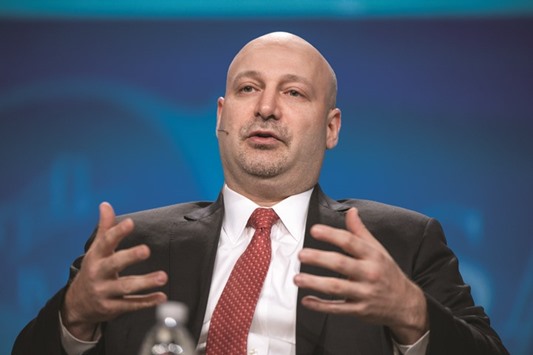Jacob Gottlieb’s Visium Asset Management, the once high-flying hedge fund firm that at its peak managed $8bn, is shutting down four of its remaining hedge funds after one of its star managers was arrested and accused of insider trading.
The New York-based firm will liquidate the main Balanced Fund, as well as its Institutional Partners Fund, Equity Alpha Fund, and Equity Alpha UCITS Fund, according to a letter to investors seen by Bloomberg News. Visium earlier struck an agreement to sell its multi-sector hedge fund to AllianceBernstein.
The decision follows months of turmoil at Visium that began in March when Gottlieb told investors his firm was under federal investigation for some trades.
On June 15, US prosecutors said they arrested Sanjay Valvani, a Visium partner and money manager, who the government claims reaped more than $32mn from trades in drug companies using secret tips. Already before the news, clients had asked to pull at least $2bn from the firm in the second quarter, people familiar with the matter said.
“These were very difficult decisions for me and the Visium team but given the uncertainty relative to the final outcome of the recent regulatory developments, the negative impact of the resulting publicity, and the substantial investor withdrawals, it became clear that maintaining the status quo was increasingly untenable for the firm,” Gottlieb said in the letter.
As of last year, the firm managed five hedge funds and a mutual fund, and was seeking to raise $500mn for a private equity vehicle. The letter didn’t discuss the private equity fund.
Valvani, who had been with the firm since it was started in 2005, ran a portion of Visium’s main fund, the Visium Balanced Fund.
US prosecutors also revealed that, in addition to Valvani, two former Visium employees were charged with securities fraud. Chris Plaford was charged with trading on illegal stock tips, and Plaford and Stefan Lumiere were accused of inflating the value of a now-closed credit fund.
Visium, which had $7bn under management as of March 31, and its founder Gottlieb weren’t accused of wrongdoing. Visium is the biggest hedge fund in the industry to have employees linked to criminal wrongdoing since the government set its sights on billionaire Steve Cohen’s SAC Capital Advisors. That firm pleaded guilty to federal insider-trading charges in 2013, agreed to pay $1.8bn and was forced to shut its doors.
Gottlieb’s firm joins several funds that have closed after employees were ensnared in the government’s multi-year probe of insider trading on Wall Street. FrontPoint Partners liquidated in 2011 amid client withdrawals after former healthcare money manager Chip Skowron was charged with securities fraud. He was sentenced to five years in prison.
Diamondback Capital Management shuttered in 2012 after former money manager Todd Newman was accused of insider trading.
Newman was found guilty, but his conviction was overturned and Diamondback was refunded a penalty it paid to the government in connection with the case.
Gottlieb said in the letter that Visium expects to finalise the transaction with AllianceBernstein within 30 days and transition all that fund’s operations in the following 90 days. The Global Fund’s investment staff and some support staff will also join the asset manager, Gottlieb said, adding he won’t join AllianceBernstein but will stay invested in the fund.
The Global strategy returned an annual average of 18.9% since its inception in 2007, two years before it became a standalone vehicle. More than $2bn was invested in the fund as of the end of March, according to an investor document obtained by Bloomberg.
“The assets are worth more in someone else’s hands, but not for long because redemptions reduce their value to potential buyers,” said Erik Gordon, a professor at the University of Michigan Ross School of Business. Visium will suspend withdrawals from the Balanced Fund in order to treat investors fairly and intends to start returning money to investors by the end of July, Gottlieb said in the letter.
The firm estimates that between 3% and 5% of the assets will be withheld to establish a reserve for the fund’s liabilities. He said specific details on the timeline will be provided to affected investors. According to the indictment, Valvani hired a consultant to get information about the approval status of a generic drug.
Valvani is accused of using the information to trade in stocks, and passing the information to Plaford, who oversaw the credit fund, prosecutors said.
Plaford and Lumiere were charged over separate allegations that they used sham broker quotes to mismark the value of securities, inflating returns, and generated more than $5.9mn in extra fees for the credit fund, the US said. Lumiere helped Plaford oversee the fund, which was called the Credit Opportunities fund and peaked at $470mn, according to court papers. It returned 32% in 2010 before fizzling out and closing in 2013, according to people with knowledge of the matter.
The expertise of Gottlieb, a trained medical doctor, drew interest in the Balanced Fund, a long-short equity fund that invests in healthcare companies. The strategy, which includes performance before Gottlieb started Visium, gained an annual average of 13% since its 2001 inception through the first quarter of this year, and oversaw about $4bn, according to an investor letter obtained by Bloomberg.
Gottlieb started his career after medical school as a buyside analyst at Sanford C Bernstein, which was bought in October 2000 by Alliance Capital to form AllianceBernstein.
He was there from 1998 until 2000, according to his LinkedIn profile. He joined Balyasny Asset Management in 2001. The healthcare strategy was spun out of Balyasny, where Gottlieb worked as a portfolio manager until 2005. Gottlieb soon started to expand the firm beyond healthcare stocks. In 2009, Visium launched Visium Global and a credit pool.

Gottlieb: Assuring to treat investors fairly.
